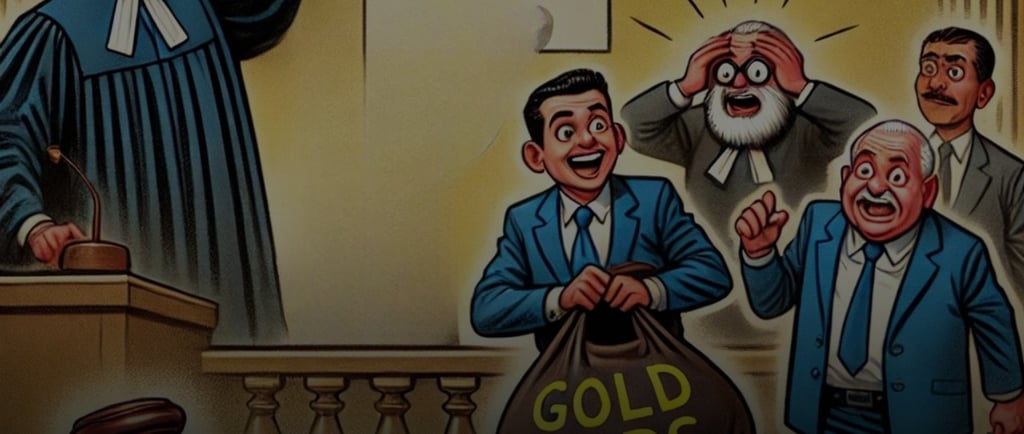Supreme Court Overturns Conviction in Vijaya Bank Fraud Case
New Delhi, February 25, 2025 – The Supreme Court of India has overturned the conviction of Nandkumar Babulal Soni in connection with the fraudulent remittance of Rs. 6.7 crore through fake Telegraphic Transfers (TT) at Vijaya Bank’s Nasik Branch. The apex court also directed the return of 205 gold bars that had been seized from the appellant.
2/27/20253 min read


The case originated in 1997 when a fraudulent account was opened at Vijaya Bank's Nasik Branch under the name of M/s. Globe International, a fictitious entity. The account received multiple TTs from the bank’s Ansari Road Branch in New Delhi, amounting to Rs. 6.7 crore. These funds were immediately withdrawn, and later investigations revealed that the transfers were bogus.
In 2001, the Central Bureau of Investigation (CBI) conducted a search at the jewelry shop of Nandkumar Babulal Soni and seized 205 gold bars. The prosecution alleged that these bars were purchased using illicit funds from the fraudulent transactions.
Trial and Conviction
The trial court had convicted accused persons under various sections of the Indian Penal Code (IPC), including 120B (criminal conspiracy), 467 (forgery), 409 (criminal breach of trust by a banker), 471 (using forged documents), and 411 (dishonestly receiving stolen property). Accused No. 3, Nandkumar Babulal Soni, was found guilty under Section 411 IPC for allegedly receiving stolen gold bars.
During the trial, the prosecution relied on statements from key witnesses, including jewelry firm owners and bank officials. The prosecution attempted to establish that the demand drafts drawn on M/s. Globe International were used to purchase the seized gold bars. However, several witnesses turned hostile, and there was no conclusive proof linking the seized gold bars to the fraudulent TTs.
High Court Proceedings
On appeal, the Bombay High Court acquitted bank officials (Accused No. 1 and No. 2) but upheld the conviction of Nandkumar Babulal Soni. The High Court also ruled that the seized gold bars should not be returned to him, as he failed to prove their lawful acquisition.
Supreme Court Judgment
The Supreme Court, in its ruling, noted several inconsistencies in the prosecution’s case. The court held that there was insufficient evidence to prove that the seized gold bars were acquired through fraudulent means. The prosecution failed to establish the identity of the gold bars as the same ones purchased using the fraudulent funds. The Court observed that suspicion, however strong, cannot replace proof beyond a reasonable doubt.
The judgment emphasized that the burden of proof lay with the prosecution to establish that Soni had knowingly received stolen property. The Court found that:
There was no direct evidence linking Soni to the fraudulent transactions.
The prosecution could not prove that the gold bars seized from Soni were the same as those acquired through illicit means.
The delay of four years in seizing the gold bars weakened the prosecution’s case.
The Supreme Court ruled in favor of Nandkumar Babulal Soni, setting aside his conviction and ordering the return of the 205 gold bars. The Court also dismissed Vijaya Bank’s appeal seeking possession of the gold bars, stating that the bank had failed to establish ownership over them.
Legal Precedent and Implications
The ruling sets an important legal precedent regarding the burden of proof in cases involving alleged receipt of stolen property. The Supreme Court reiterated that circumstantial evidence must be conclusive and that prosecution cannot rely on suspicion alone.
This judgment is expected to impact future cases where financial fraud and money laundering allegations rely heavily on circumstantial evidence. Legal experts suggest that this verdict underscores the necessity of solid forensic and documentary evidence to establish guilt beyond a reasonable doubt.
The case highlights the complexities of financial fraud investigations, particularly in instances where transactions involve multiple intermediaries and extended periods of delay before legal action is taken.
Conclusion
With this ruling, Nandkumar Babulal Soni is exonerated, and the 205 gold bars seized from him will be returned. The judgment serves as a critical reminder that legal proceedings must adhere strictly to the principles of fair trial and conclusive evidence. The Supreme Court's decision once again reinforces the legal maxim that an accused is innocent until proven guilty beyond a reasonable doubt.
